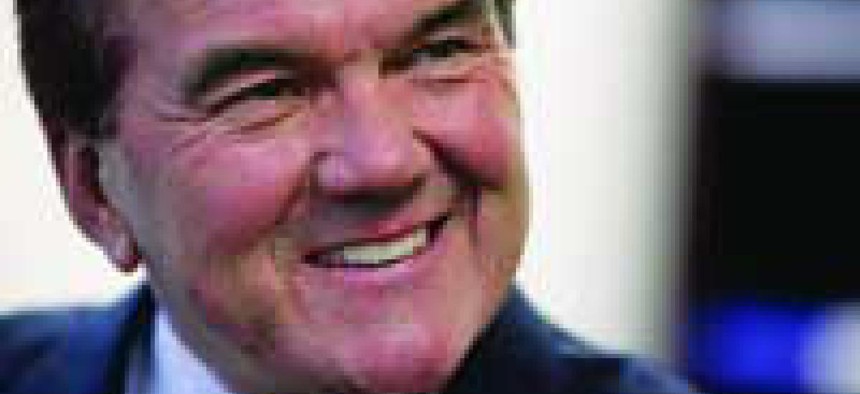A conversation with Tom Ridge


Tom Ridge
Newscom
There are opportunities to affect real change by helping state leaders apply the best practices of the private sector and other state governments, he said.
Such challenges are invigorating to Ridge, a self-described problem solver. At the nexus where a state's policy and practice come face-to-face with the citizens they serve is where you'll find the best opportunities to make a positive difference, he said.
Eager to work on state health care and transportation issues, Ridge also plans to work with New York-based Deloitte and state leaders to better use IT to improve public education.
Ridge spoke recently with staff writer Ethan Butterfield about his role at Deloitte, the challenges facing state government and how much remains to be done in the pursuit of homeland security.
Q: What role do you envision for yourself with Deloitte?
Ridge: With the great frustration that a lot of Americans have with the ineffectiveness of the federal government, you're going to see more people looking to governors to be innovators and leaders in areas that heretofore weren't thought of. I'll be going into states, identifying a problem and turning it into an opportunity for that governor or cabinet secretary to achieve an outcome and be an innovator. That's an exciting environment in which I look forward to spending my time.
Q: What specific issues will you help states tackle?
Ridge: Everybody is dealing with Medicaid. Some are dealing with unfunded pensions and some are not. Some are dealing with an aging workforce, some are not. All are struggling to improve the quality of public education. So I will interact with the governors or cabinet secretaries in these states to explore with them perhaps a change in methodology, an infusion of new technology, a different problem-solving mix, a re-engineering of what they did in the past. I want to help them find better outcomes.
Q: What are the greatest challenges that state and local governments face today?
Ridge: Health care and education. And just trying to reduce the cost of providing basic services. But it's more than just reducing administrative costs these days. If you can keep people healthier with some form of case management system, keep them out of the emergency room and keep them from getting sick, then in the long run you reduce your health care costs and ease the burden on Medicaid. I know everybody talks about using IT for waste, fraud and abuse, and there's plenty of that, but you also can use IT more effectively to manage individual patients.
"Five years after 9/11, we still don't have a nationwide broadband public safety network?" - Tom Ridge
Q: What are the states' greatest education challenges?
Ridge: The 21st century global marketplace is a knowledge-based economy. Most of the knowledge is based on your ability to read and do math. We need to do a better job at the primary level of education in nurturing a child's natural curiosity to learn through enhancing his or her ability to read and do basic math.
Q: What challenges do federal, state and local governments face in the realm of homeland security?
Ridge: Five years after 9/11, we still don't have a nationwide broadband public safety network? I don't know what it takes. If 9/11 can't get us there, I'm not sure what will.
Other challenges are less in the area of IT and communications networks, and more [to do with] what substantive information will be communicated on a regular basis. Through the Homeland Security and Justice departments, the outreach and embedding of certain means of notice and sharing information has improved. But the real challenge in future years is to make sure that timely and accurate information is fed down to the state and locals.
Q: Where do you see that government, at any level, to date has made the most improvement in homeland security?
Ridge: We're investing hundreds and hundreds of millions of dollars trying to get technology that detects radiological material or nuclear material, but there are some great opportunities for the technology of detection in disease surveillance. When you tie in pharmacies, emergency rooms and doctors' offices so that public health officials can get a heads-up that there might be a disaster of one form or another: mother nature or terrorists. That's an area that is hugely important. There's always a place for technology just to reduce cost, but there are other areas where you can use it to dramatically enhance your public safety capabilities, disease surveillance and communications.
NEXT STORY: Who's on first?